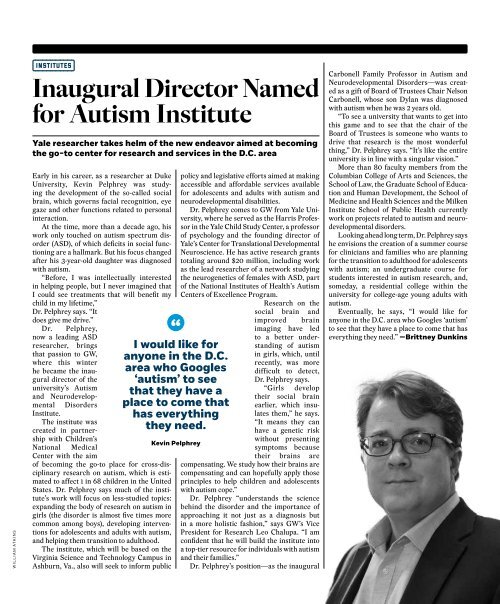Create successful ePaper yourself
Turn your PDF publications into a flip-book with our unique Google optimized e-Paper software.
WILLIAM ATKINS<br />
[institutes]<br />
<strong>In</strong>augural Direc<strong>to</strong>r Named<br />
for Autism <strong>In</strong>stitute<br />
Yale researcher takes helm of the new endeavor aimed at becoming<br />
the go-<strong>to</strong> center for research and services in the D.C. area<br />
Early in his career, as a researcher at Duke<br />
University, Kevin Pelphrey was studying<br />
the development of the so-called social<br />
brain, which governs facial recognition, eye<br />
gaze and other functions related <strong>to</strong> personal<br />
interaction.<br />
At the time, more than a decade ago, his<br />
work only <strong>to</strong>uched on autism spectrum disorder<br />
(ASD), of which deficits in social functioning<br />
are a hallmark. But his focus changed<br />
after his 3-year-old daughter was diagnosed<br />
with autism.<br />
“Before, I was intellectually interested<br />
in helping people, but I never imagined that<br />
I could see treatments that will benefit my<br />
child in my lifetime,”<br />
Dr. Pelphrey says. “It<br />
does give me drive.”<br />
Dr. Pelphrey,<br />
now a leading ASD<br />
researcher, brings<br />
that passion <strong>to</strong> GW,<br />
where this winter<br />
he became the inaugural<br />
direc<strong>to</strong>r of the<br />
university’s Autism<br />
and Neurodevelopmental<br />
Disorders<br />
<strong>In</strong>stitute.<br />
The institute was<br />
created in partnership<br />
with Children’s<br />
National Medical<br />
Center with the aim<br />
of becoming the go-<strong>to</strong> place for cross-disciplinary<br />
research on autism, which is estimated<br />
<strong>to</strong> affect 1 in 68 children in the United<br />
States. Dr. Pelphrey says much of the institute’s<br />
work will focus on less-studied <strong>to</strong>pics:<br />
expanding the body of research on autism in<br />
girls (the disorder is almost five times more<br />
common among boys), developing interventions<br />
for adolescents and adults with autism,<br />
and helping them transition <strong>to</strong> adulthood.<br />
The institute, which will be based on the<br />
Virginia Science and Technology Campus in<br />
Ashburn, Va., also will seek <strong>to</strong> inform public<br />
I would like for<br />
anyone in the D.C.<br />
area who Googles<br />
‘autism’ <strong>to</strong> see<br />
that they have a<br />
place <strong>to</strong> come that<br />
has everything<br />
they need.<br />
Kevin Pelphrey<br />
policy and legislative efforts aimed at making<br />
accessible and affordable services available<br />
for adolescents and adults with autism and<br />
neurodevelopmental disabilities.<br />
Dr. Pelphrey comes <strong>to</strong> GW from Yale University,<br />
where he served as the Harris Professor<br />
in the Yale Child Study Center, a professor<br />
of psychology and the founding direc<strong>to</strong>r of<br />
Yale’s Center for Translational Developmental<br />
Neuroscience. He has active research grants<br />
<strong>to</strong>taling around $20 million, including work<br />
as the lead researcher of a network studying<br />
the neurogenetics of females with ASD, part<br />
of the National <strong>In</strong>stitutes of Health’s Autism<br />
Centers of Excellence Program.<br />
Research on the<br />
social brain and<br />
improved brain<br />
imaging have led<br />
<strong>to</strong> a better understanding<br />
of autism<br />
in girls, which, until<br />
recently, was more<br />
difficult <strong>to</strong> detect,<br />
Dr. Pelphrey says.<br />
“Girls develop<br />
their social brain<br />
earlier, which insulates<br />
them,” he says.<br />
“It means they can<br />
have a genetic risk<br />
without presenting<br />
symp<strong>to</strong>ms because<br />
their brains are<br />
compensating. We study how their brains are<br />
compensating and can hopefully apply those<br />
principles <strong>to</strong> help children and adolescents<br />
with autism cope.”<br />
Dr. Pelphrey “understands the science<br />
behind the disorder and the importance of<br />
approaching it not just as a diagnosis but<br />
in a more holistic fashion,” says GW’s Vice<br />
President for Research Leo Chalupa. “I am<br />
confident that he will build the institute in<strong>to</strong><br />
a <strong>to</strong>p-tier resource for individuals with autism<br />
and their families.”<br />
Dr. Pelphrey’s position—as the inaugural<br />
Carbonell Family Professor in Autism and<br />
Neurodevelopmental Disorders—was created<br />
as a gift of Board of Trustees Chair Nelson<br />
Carbonell, whose son Dylan was diagnosed<br />
with autism when he was 2 years old.<br />
“To see a university that wants <strong>to</strong> get in<strong>to</strong><br />
this game and <strong>to</strong> see that the chair of the<br />
Board of Trustees is someone who wants <strong>to</strong><br />
drive that research is the most wonderful<br />
thing,” Dr. Pelphrey says. “It’s like the entire<br />
university is in line with a singular vision.”<br />
More than 80 faculty members from the<br />
Columbian College of Arts and Sciences, the<br />
School of Law, the Graduate School of Education<br />
and Human Development, the School of<br />
Medicine and Health Sciences and the Milken<br />
<strong>In</strong>stitute School of Public Health currently<br />
work on projects related <strong>to</strong> autism and neurodevelopmental<br />
disorders.<br />
Looking ahead long term, Dr. Pelphrey says<br />
he envisions the creation of a summer course<br />
for clinicians and families who are planning<br />
for the transition <strong>to</strong> adulthood for adolescents<br />
with autism; an undergraduate course for<br />
students interested in autism research, and,<br />
someday, a residential college within the<br />
university for college-age young adults with<br />
autism.<br />
Eventually, he says, “I would like for<br />
anyone in the D.C. area who Googles ‘autism’<br />
<strong>to</strong> see that they have a place <strong>to</strong> come that has<br />
everything they need.” —Brittney Dunkins<br />
gwmagazine.com / 13


